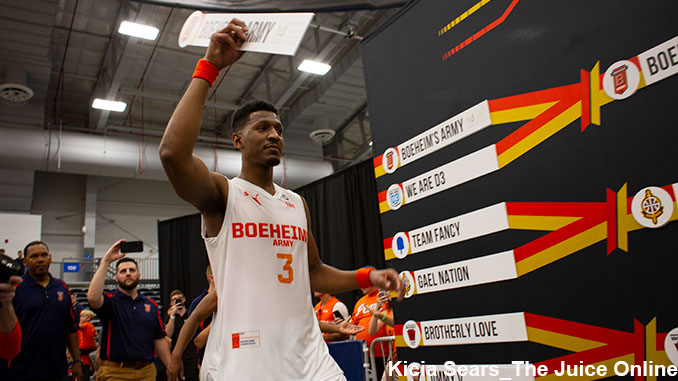
One year after claiming the top prize, a retooled Boeheim’s Army team got bounced from the Basketball Tournament quickly, getting eliminated by The Nerd Team in the second round of the Syracuse regional. How did their dreams of back-to-back titles get snuffed out so quickly?
Team defense was far from its performance during the year prior.
The 2021 version of Boeheim’s Army finished seventh in points allowed per game in the tournament, giving up just 61.5 points per game. Team 23, who they defeated in the title game, was the only other team to make at least the tournament quarterfinals that ranked in the top 20 in points allowed, finishing 18th.
This time around, the Army gave up 81 points to The Nerd Team. Boeheim’s Army did not give up 70 points in any game last summer and this most recent loss was the first time they gave up 70 or more points in a game since getting bounced from the 2019 tournament.
One of the reasons D.J. Kennedy and Deandre Kane helped the Army to that 2021 title was their willingness to grind on defense and slow games down. Keeping the pace down and making individual baskets more meaningful allowed a spotty offensive team (41.5 percent shooting on field goals, 31.4 percent on 3s) to win a title.
Injuries popped up after the first game.
Tyler Ennis played one game, then had to sit out due to back spasms. Kane gave it a go in the second round, but played just 1:19 against the Nerd Team before having to sit out the rest of the game. Kennedy fought through a hamstring issue to play nearly 20 minutes for the Army in the loss and was one of the squad’s better players, tallying ten points on 5-of-7 shooting along with five rebounds and three steals.
While Kane and Kennedy profile more as wing players in TBT, they both are effective passers and ballhandlers, although the latter is best kept to limited doses. Collectively, those injuries reduced the Army’s options for offensive triggermen, as well as shortening the playing rotation and stretching the minutes of the remainder of the roster.
Both the 3-point shooting and defense were woeful.
Boeheim’s Army shot 13-for-50 from 3-point range. That 26.0 percent mark stands 54th out of the 64 teams in The Basketball Tournament as of this writing. Every team that shot as poorly as the Army or worse is watching the rest of the tournament.
Only three players made a shot from beyond the arc for Boeheim’s Army – Dee Bost, Matt Morgan, and Andrew White III. That trio made one-third of their shots from 3 while the rest of the team missed a collective 11 attempts from deep. Four of the eight remaining teams in the tournament averaged in double digits in 3s made per game and four of the six teams that shot at least 38.3 percent from beyond the arc still have their tournament championship hopes alive.
The Army gave up 28 3-pointers on 45.2 percent shooting from beyond the arc in two games. Nothing more needs to be said about that.
Guard play was not what it needs to be for TBT success.
Yes, Ennis was on the shelf for the game where Boeheim’s Army was eliminated. However, Ennis does not profile as the type of guard needed for success in this tournament where most games are more like an All-Star game than anything else.
TBT teams are mostly slapped together thanks to tenuous connections, like players having overlapped at the same college or previously playing either with or against players in a foreign league. Thus, guards need to do two simple things to set their TBT squads up for success on offense:
- Drive to both score and set up teammates.
- Shoot 3-pointers well.
» Related: Boeheim’s Army ousted by The Nerd Team, 81-74
Ennis is a steady, “run the offense” point guard. In his four NBA seasons spread over four franchises, Ennis carded just under a 2.1-to-1 assist-to-turnover ratio. In his lone season at Syracuse, he posted a 3.22-to-1 mark. Ennis has never been a true offensive creator, but more of a “coach on the floor” who runs a tight, effective ship.
And while the shot most remember Ennis for during his time at Syracuse was a 3-pointer, he has shot under 32 percent from 3 in the NBA and under 33 percent in other various professional leagues. It should not be much of a surprise that Ennis was 2-of-9 from 3 in his lone appearance this summer.
Ennis’ replacement in the starting lineup in the second game, Matt Morgan, was probably the best player for this version of the Army. Morgan tied for the team lead with guard Dee Bost in scoring at 17.5 points per game and trailed Bost in field goal attempts per game (are we getting the theme about how this is a guard-dominated tournament?). Morgan handed out 3.5 assists per game, shot 50 percent overall, and tied for the team lead at 36.4 percent from 3.
While Bost was a much more heralded addition to Boeheim’s Army this year, his play was not nearly as impressive as Morgan’s efforts. Bost shot 37.9 percent from the field and 29.4 percent from 3 and handed out just four assists in the two games.
Like other non-Syracuse players to sign up with Boeheim’s Army in previous years, including Tyrese Rice and Jordan Crawford, Bost was heralded as the team’s biggest addition prior to the tournament as a point guard who can shoot, score, and create for his teammates. His spotty results hindered the Army’s efforts at going back-to-back.
While the injuries are an uncontrollable part of the game of basketball, the focus on defense and premium guard play are lessons to be carried forward for future summers. Boeheim’s Army should focus on guards who can produce on offense and surround them with players who can defend, including those who can knock down open 3s.
For more Syracuse coverage, like us on Facebook, follow us on Twitter and Instagram, and listen to our podcast.

